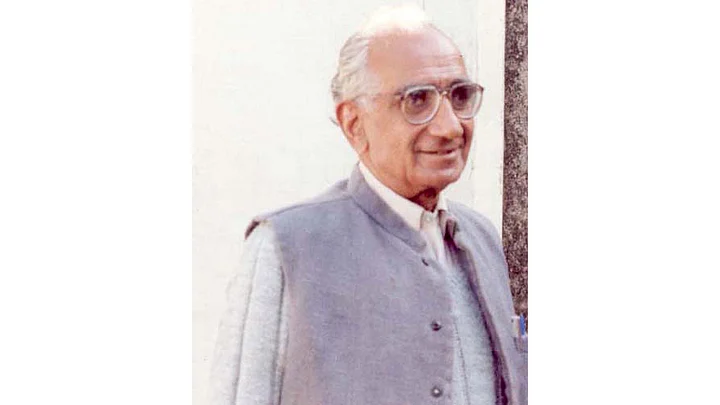If there’s one thing the two nations on either side of the border have in common, it’s their veneration of their men of letters.
India and Pakistan have always remembered with great fondness their poets from both the pre-independence and post-independence era. Yet, if there’s one man who hasn’t received his just desserts – even amongst his illustrious peers – it’s Jagan Nath Azad, a Hindu poet based in Lahore.
Azad is the son of Tilok Chand Mahrum – himself a poet of renown. In fact, while alive, the father-son duo created a generous body of work that earned them much plaudits. Yet the sad truth is, that while poets like Tagore and Harivansh Rai Bachchan continue to be remembered for their poetry and their writing, Azad is remembered not so much for his work – but for a raging controversy.
Reclaiming a Poet, Beyond all Speculation
Jagan Nath Azad’s name has popped up time and time again in the media in recent years, with one question at its epicentre – did the Hindu poet write the first national anthem of Pakistan? Some go as far as to say that it was free Pakistan’s first leader Mohammad Ali Jinnah who had asked Azad to write it.
“Aey sarzameen-i-pak Zarrey terey hein aaj sitaron sey tabnak Roshan heh kehkashan sey kahin aaj teri khak” (Oh land of Pakistan, each particle of yours is being illuminated by stars. Even your dust has been brightened like a rainbow)
This verse was published in The Hindu in 2005. The article attributed these lines to the first National Anthem of Pakistan and claimed that it was written by Azad. However, many since have dismissed these claims.
According to The Hindu, the song written by Jagan Nath Azad served as Pakistan’s national anthem for a year and a half. After Jinnah’s death, a song written by the Urdu poet Hafiz Jallundhari was chosen as the national anthem.
There are many theories, many speculations, many claims – each seemingly more irrevocable than the ones before. But we at The Quint, would rather remember the man for the poet he was than for anything else.
Let’s revive the legacy of a man whose name has somehow been lost from the pages of history, both in India and in Pakistan.
How Azad Came to Write the ‘Lost’ Anthem of Pakistan...
Azad, in this poignant interview to The Hindu, waxed eloquent about how Jinnah first approached him to write the national anthem.
In August 1947, when mayhem had struck the whole Indian subcontinent, I was in Lahore working in a literary newspaper. All my relatives had left for India and for me to think of leaving Lahore was painful. I decided to take a chance and stay on for some time. My Muslim friends requested me to stay on and took responsibility of my safety. On the morning of August 9, 1947, there was a message from Pakistan’s first Governor-General, Mohammad Ali Jinnah. It was through a friend working in Radio Lahore who called me to his office. He told me `Quaid-e-Azam wants you to write a national anthem for Pakistan.’ I told them it would be difficult to pen it in five days and my friend pleaded that as the request has come from the tallest leader of Pakistan, I should consider his request. On much persistence, I agreed.
– Jagan Nath Azad told The Hindu
Here’s a delightful look at one of Jagan Nath Azad’s mushairas in Pakistan:
What’s it Like Being a Hindu Urdu Poet in Pakistan?
Azad was born in 1918 in a little-known town called Isa Khel in Mianwali District, Punjab (300 kms from Lahore); he died in Lahore in 2004.
Azad was at his writing desk until 15 days before he passed away. The literary giant has penned over 70 books, including poetry collections, epic poems, biographies and travelogues.
It was Azad’s father Tilok Chand Mehroom who first introduced Azad to Urdu poetry through the Diwan-e-Ghalib, also taking the impressionable boy to various mushairas. In fact, this turned out to have quite an impact on Azad’s literary career as it was at one such mushaira that he met Hafeez Jalandhari for the first time. The latter presented him with a copy of Hindustan Hamara – one which he would read, cherish and re-read in the years to come.
Here’s something you didn’t know – when Azad stood first in his MA examinations at University of Punjab (Lahore) in 1944, he was awarded a set of Rabindra Nath Tagore’s books. It is heartening to realise that literature clearly transcended border disputes even at a time of great political turmoil.
Azad was elected vice-president of Anjuman Taraqqi-i-Urdu (Hind) (a national body for the promotion of Urdu under the Ministry of Human Resource Development in Pakistan) in 1989 and President in 1993, remaining in this office till his demise.
It is believed that the partition of India strongly affected Jagan Nath Azad, who went on record to say,
...political divisions cannot divide the Indian poets from their love of Pakistan, nor the Pakistani poets from their love for India.
– as reported by Pammi, Jagan Nath Azad’s daughter
We leave you with the stirring notes of yet another gem of a mushaira by the forgotten Hindu poet of Pakistan.
(At The Quint, we question everything. Play an active role in shaping our journalism by becoming a member today.)
